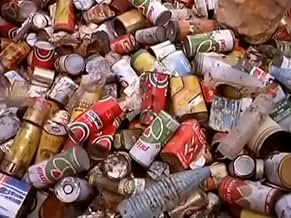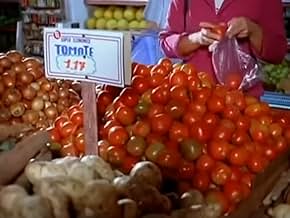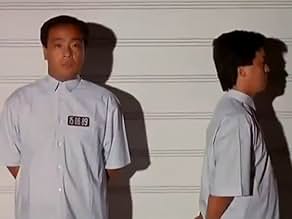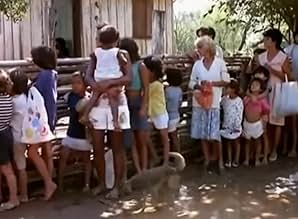A tomato is planted, harvested, transported and sold in a supermarket, but it rots and ends up in the trash. The film follows it to its true end, all to make clear the difference between tom... Read allA tomato is planted, harvested, transported and sold in a supermarket, but it rots and ends up in the trash. The film follows it to its true end, all to make clear the difference between tomatoes, pigs, and human beings.A tomato is planted, harvested, transported and sold in a supermarket, but it rots and ends up in the trash. The film follows it to its true end, all to make clear the difference between tomatoes, pigs, and human beings.
- Director
- Writers
- Stars
- Awards
- 4 wins total
- Director
- Writers
- All cast & crew
- Production, box office & more at IMDbPro
8.57K
1
2
3
4
5
6
7
8
9
10
Featured reviews
A little masterpiece
Here's a work that definitely proves how exciting and questioning a short movie picture can be.
Acting as a director, writer and producer, Jorge Furtado couragely aims a dazzling machinegun at issues as assorted as religion, Holocaust, Brazilian government, poverty, capitalism, and how human intelligence has been used throughout the ages.
Using a dialectical method, and narrating the story in a way that "even a Martian would understand", in the words of the author, the film forges a real cinematographical theorem of Brazilian deplorable situation, borrowing as the stage a neighbourhood in the city of Porto Alegre (one of Brazil's most developed ones, by the way). The degrading scenario, however, would apply to any community on the world in which the effects of money (or its lack) on the lives of its inhabitants are more visible.
In the movie's touching final take, Furtado destroys the bourgeois concept of Freedom, quoting a line from one of Brazil's greatest poetesses, Cecilia Meirelles, and leaves us wondering whether modern 'civilisation' is as far as the human intellect can take us.
Acting as a director, writer and producer, Jorge Furtado couragely aims a dazzling machinegun at issues as assorted as religion, Holocaust, Brazilian government, poverty, capitalism, and how human intelligence has been used throughout the ages.
Using a dialectical method, and narrating the story in a way that "even a Martian would understand", in the words of the author, the film forges a real cinematographical theorem of Brazilian deplorable situation, borrowing as the stage a neighbourhood in the city of Porto Alegre (one of Brazil's most developed ones, by the way). The degrading scenario, however, would apply to any community on the world in which the effects of money (or its lack) on the lives of its inhabitants are more visible.
In the movie's touching final take, Furtado destroys the bourgeois concept of Freedom, quoting a line from one of Brazil's greatest poetesses, Cecilia Meirelles, and leaves us wondering whether modern 'civilisation' is as far as the human intellect can take us.
The Wild Brazilian Capitalism, or The Difference Between Tomatoes, Pigs and Poor Brazilian People
The ironic, heartbreaking and acid "saga" of a spoiled tomato: from the plantation of a "Nisei" (Brazilian with Japanese origins); to a supermarket; to a consumer's kitchen to become sauce of a pork meat; to the garbage can since it is spoiled for the consumption; to a garbage truck to be dumped in a garbage dump in "Ilha das Flores"; to the selection of nutriment for pigs by the employees of a pigs breeder; to become food for poor Brazilian people.
Today I have had the chance to see "Ilha das Flores", one of the first works of Jorge Furtado, one of or maybe my favorite Brazilian director in the present days. With a perfect logic, and a pace of video clip, Jorge Furtado exposes the wild Brazilian capitalism, where there are two countries: for those that can afford, and for the millions of miserable that are below a pig in the hierarchy of disputing garbage. This documentary is a devastating and overwhelming social critic to our modern society and may be seen as a funny satire by foreigners, but unfortunately reflects the sad reality of my country. Mandatory masterpiece! My vote is ten.
Title (Brazil): "Ilha das Flores" ("Isle of Flowers")
Today I have had the chance to see "Ilha das Flores", one of the first works of Jorge Furtado, one of or maybe my favorite Brazilian director in the present days. With a perfect logic, and a pace of video clip, Jorge Furtado exposes the wild Brazilian capitalism, where there are two countries: for those that can afford, and for the millions of miserable that are below a pig in the hierarchy of disputing garbage. This documentary is a devastating and overwhelming social critic to our modern society and may be seen as a funny satire by foreigners, but unfortunately reflects the sad reality of my country. Mandatory masterpiece! My vote is ten.
Title (Brazil): "Ilha das Flores" ("Isle of Flowers")
10thbzcrt
A thrilling social documentary
That's the kind of movie you'll see quite by chance, one evening on television. And you will never forget it.
"Ilha das flores" is the story of a tomato, from the field where it is cultivated to the dustbin, and beyond. It's fun, and, at the same time, it tells you a lot about the economy and the Brazilian society. What is really unique for a documentary is that the story is as pleasant to follow as in a fiction, and the end is one of the more stunning and moving end I have ever seen in a movie.
"Ilha das flores" is the story of a tomato, from the field where it is cultivated to the dustbin, and beyond. It's fun, and, at the same time, it tells you a lot about the economy and the Brazilian society. What is really unique for a documentary is that the story is as pleasant to follow as in a fiction, and the end is one of the more stunning and moving end I have ever seen in a movie.
10Trufó
Funny... at first.
Funny at first, demolishing in the end. When I saw this movie for the first time I spend the first minutes laughing: the editing is fast paced and the voice over explains one after another different concepts that apparently are barely connected. But in the end all grows into a perfectly mounted description of the economical and political aberrations of our times, all in less than 30 minutes.
Woah
Saw this documentary short subject in my World Society course at UC Santa Cruz. It's about capitalism, told through the story of a tomato. But, thinking back on it, it was much more than just that tomato, that went into the making of the family's dinner, which was bought with money, which was acquired through the mother's perfume sales, which is an alcohol-based topical fragrance oil. If you're wondering what I'm talking about, this is how the film is paced. It is the very reason the word "Tangential" was created. Furtado is so crafty at taking you to places you never think you'll go; from painfully hilarious irony (the monty python-esque first 5 minutes), to head-battering shock (the history of "the second");just by mentioning a single word, you could travel from a dollar bill to a pile of emaciated bodies, within a matter of seconds. And none of the connections are far-fetched. His story is based on the theory of six degrees of separation, and how he arrives at those final, latent images of haunting truth is a trip that must be taken.
I was recently compiling a list of my favorite movies of 2000, and the best films I saw were the reissues of "The Exorcist" and "Blood Simple", and this, a 15 minute documentary about capitalism. Very weird, but it is true. If I ever get the chance to see this again, I will relish every second of it as if it were the first time. And if you are a student, you should check your campus library for "Ilha das flores", because it is amazing.
I was recently compiling a list of my favorite movies of 2000, and the best films I saw were the reissues of "The Exorcist" and "Blood Simple", and this, a 15 minute documentary about capitalism. Very weird, but it is true. If I ever get the chance to see this again, I will relish every second of it as if it were the first time. And if you are a student, you should check your campus library for "Ilha das flores", because it is amazing.
Did you know
- TriviaThe short opens with three short sentences on screen: "Este filme não é um filme de ficção. Existe um lugar chamado Ilha das Flores. Deus não existe." [This film is not a work of fiction. There is a place named Island of Flowers. God does not exist.]
- ConnectionsFeatures Nazi Concentration and Prison Camps (1945)
Details
- Release date
- Country of origin
- Language
- Also known as
- Island of Flowers
- Filming locations
- Ilha das Flores, Porto Alegre, Rio Grande do Sul, Brazil(30º 12' 30" S, 51º 11' 21" W)
- Production company
- See more company credits at IMDbPro
- Runtime
- 13m
- Sound mix
- Aspect ratio
- 1.37 : 1
Contribute to this page
Suggest an edit or add missing content























